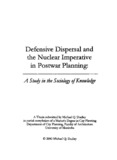Defensive dispersal and the nuclear imperative in postwar planning: a study in the sociology of knowledge

View Open
Metadata
Show full item recordAuthor
Dudley, Michael
Date
2001-05-01Citation
Dudley, Michael. Defensive dispersal and the nuclear imperative in postwar planning: a study in the sociology of knowledge; A Thesis submitted by Michael Q. Dudley in partial completion of a Master's Degree in City Planning, Department of City Planning, Faculty of Architecture, University of Manitoba. Winnipeg, 2000
Abstract
In the aftermath of the atomic bombings of Hiroshima and Nagasaki in the final days of World War II, an urban planning concept known as 'defensive dispersal' came to be advocated by city planners, architects, atomic scientists, military strategists. Defensive dispersal advocates saw in the contemporary American city concentrations of industry and population that would prove tempting targets for an enemy armed with nuclear weapons. The solution they put forth was that these populations and should be moved (or encouraged to be moved) out of cities and into smaller satellite towns. The atomic bomb became, therefore, a potent argument for the very features of the postwar urban form that have commonly been cited as contributors to sprawl and urban decline: low-density peripheral development, deindustrialization, the Interstate Highway system and urban renewal. As important as this school of thought was during the 1940s and 1950s, it is rarely mentioned in the planning, sociological or historical literatures today. A principal thrust behind this study is to determine the reasons for this academic incuriousness and what this absence represents not only for planning history and theory, but the social history of the Cold War as well.
